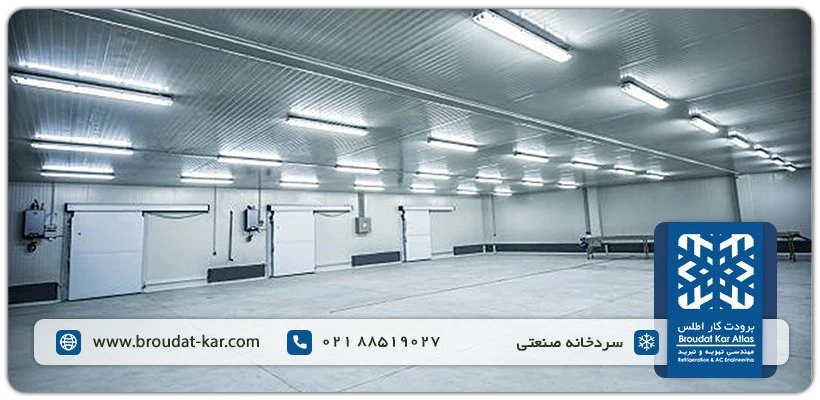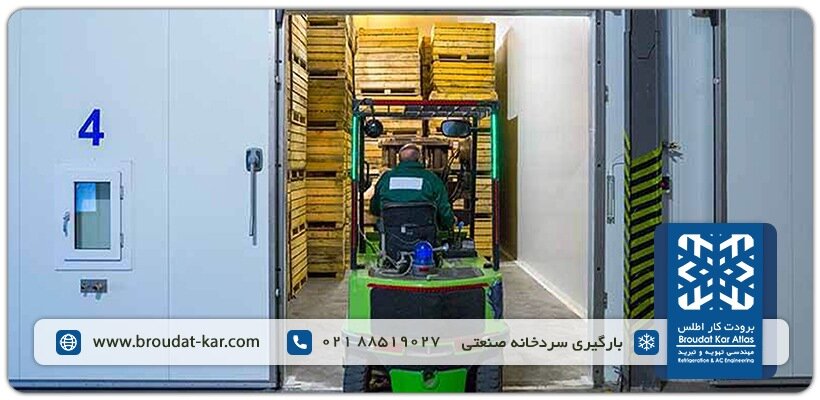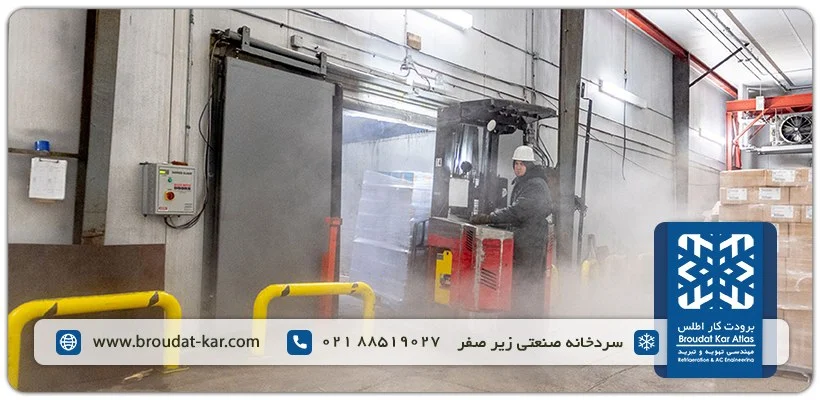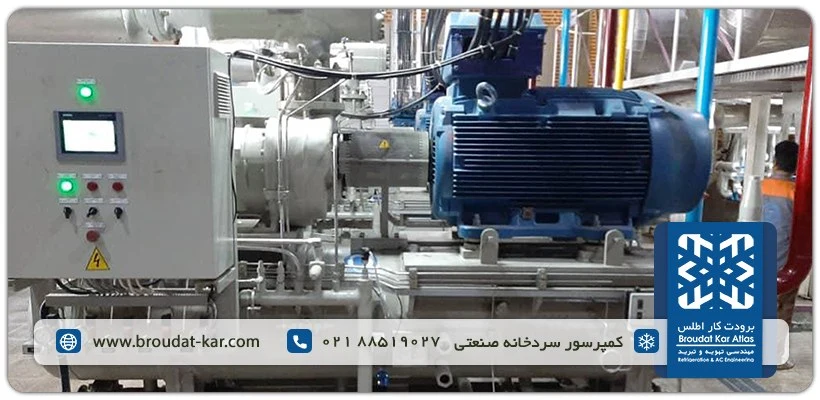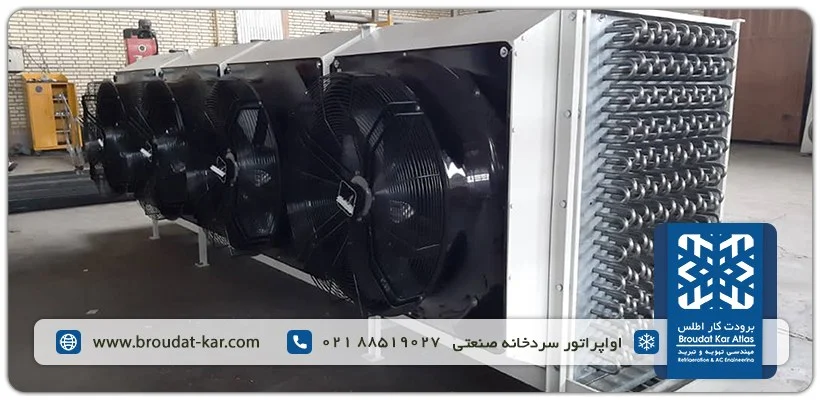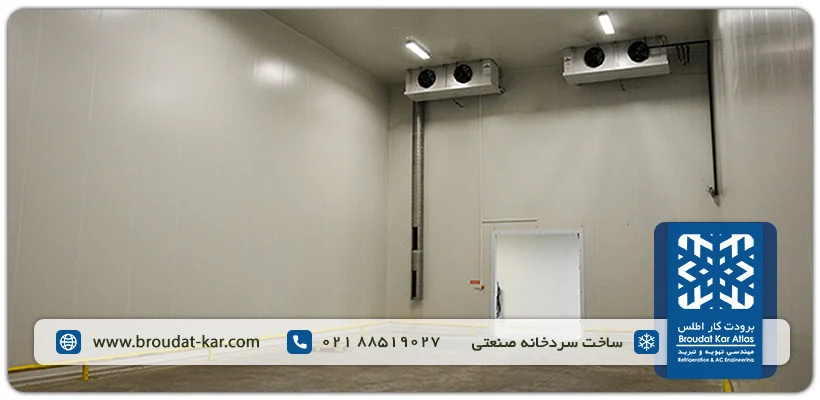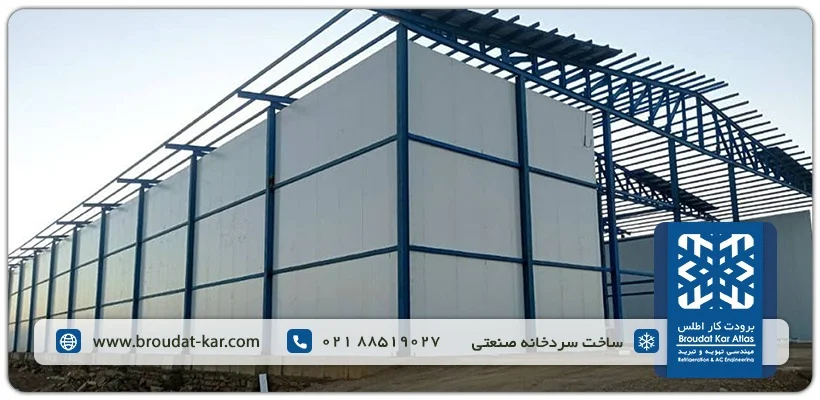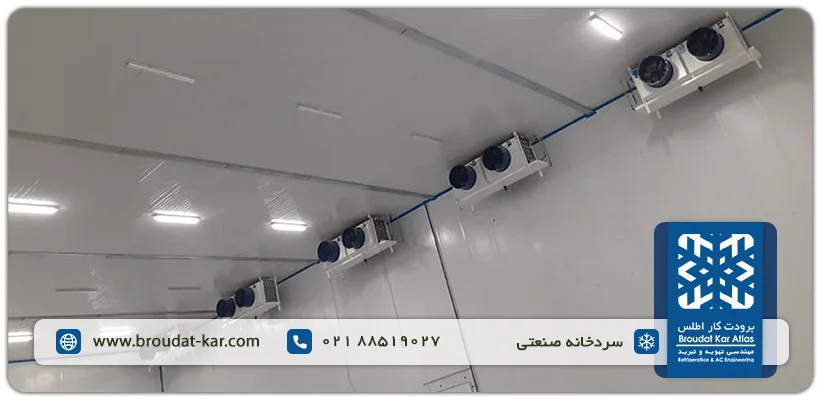What is Industrial Cold store?
An industrial cold store is a large-scale facility designed and constructed to preserve and store temperature-sensitive goods and products. It provides a controlled environment where temperature and humidity levels are meticulously regulated to ensure optimal conditions and prolong the shelf life of perishable items. Unlike standard cold stores, which may cater to smaller volumes or specific industries, industrial cold stores are typically designed to accommodate substantial quantities, often exceeding 2000 tons, of goods.
Various industries, including food production and processing, pharmaceuticals, chemicals, and logistics, rely on industrial cold stores for their storage needs. These facilities are equipped with advanced refrigeration systems, insulation materials, and sophisticated monitoring and control mechanisms to establish a stable and controlled environment tailored to the specific temperature requirements of different products. Industrial cold stores play a critical role in safeguarding the health and quality of goods throughout the supply chain, from production and distribution to the end consumer.
Globally, cold storage facilities save over 250 billion kilograms of food annually, playing a vital role in reducing hunger and promoting food security.
Importance of Industrial Cold Storage Across Various Industries
Food Industry
The food industry relies extensively on industrial cold storage to uphold the freshness, safety, and quality of perishable food products. These facilities enable the storage of a diverse range of food items, including fruits, vegetables, dairy products, meat, and seafood, at specific temperature and humidity levels. By maintaining the cold storage chain, industrial cold storage facilities mitigate spoilage, reduce food waste, and extend the shelf life of products. Moreover, they play a crucial role in ensuring food safety by impeding the growth of harmful bacteria and pathogens. 
Industrial cold storage supports efficient inventory management and provides year-round access to seasonal or perishable foods, meeting the demands of consumers and food businesses alike.
Pharmaceutical Industry
In the pharmaceutical sector, preserving the quality and safety of drugs and vaccines is paramount. Industrial cold storage facilities offer controlled environments where pharmaceutical products can be stored at precise temperatures, ensuring their effectiveness and stability. Many medicines, including vaccines and certain drugs, require specific temperature ranges for storage, as any deviation can compromise their efficacy or safety. Industrial refrigerators provide the necessary conditions to store these temperature-sensitive drugs and maintain their therapeutic properties. Furthermore, they facilitate drug distribution by enabling safe transport and storage throughout the supply chain.
Chemical Industry
The chemical industry frequently deals with substances that require controlled temperature storage. Industrial cold storage facilities provide suitable conditions for storing various chemical products, including specialized chemicals, raw materials, and intermediates. By maintaining temperature conditions, these facilities prevent chemical reactions, degradation, and alterations in material properties. The controlled environment ensures the stability and quality of chemicals, contributing to the overall efficiency of chemical production processes. Additionally, industrial cold storage enhances safety by minimizing the risk of fire, explosion, or hazardous reactions associated with improper chemical storage.
Logistics and Distribution
Efficient logistics and distribution are essential across industries, and industrial cold storage plays a pivotal role in supporting these operations. These facilities serve as key centers for storing temperature-sensitive goods during transportation and distribution. Industrial cold storage enables the consolidation, maintenance, and temporary storage of goods, facilitating efficient coordination of shipments and minimizing transportation time.
By providing proper storage conditions, they preserve the quality and integrity of products during transportation and ensure they reach their destination in optimal conditions. Moreover, industrial cold storage facilities streamline inventory management, enabling seamless order processing and timely delivery.
Distinguishing Between Cold Storage and Industrial Cold Storage
This segment explores the distinctions between a cold room and an industrial cold storage facility. Firstly, we outline the general disparities between cold storage and industrial cold storage, followed by an examination of their technical variances.
General Contrasts between Cold Storage and Industrial Cold Storage
Scale and Capacity
Cold rooms typically denote smaller, autonomous facilities or units intended for storing temperature-sensitive goods in limited volumes. Often found in retail centers, restaurants, or smaller distribution centers, cold rooms are characterized by their smaller scale. Conversely, industrial cold stores exhibit significantly larger dimensions and boast much higher storage capacities. Industrial cold storage facilities, typically storing 2000 tons or more, cater to the storage of substantial quantities of temperature-sensitive materials utilized by industries. These expansive spaces often comprise multiple halls to accommodate diverse products.
Specialized Infrastructure and Equipment
Industrial cold storage necessitates specialized infrastructure and equipment due to its scale and capacity. Equipped with robust refrigeration systems, these facilities uphold precise temperatures throughout the storage area. Polyurethane insulation, chosen for its suitability to cold room temperatures, enhances temperature control and energy efficiency. Additionally, industrial cold storage facilities often feature advanced monitoring and control mechanisms, including remote monitoring and alert systems, to ensure operational integrity.
Customization and Compatibility
Tailored to meet the requirements of industries handling temperature-sensitive materials, industrial cold storage system offer greater flexibility and customization options compared to smaller cold store units. Specialized features such as pre-cooling, rapid freezing, fruit delivery, or controlled atmosphere storage are commonplace. The adaptability and expandability of industrial cold storage enable businesses to accommodate a wide array of products with varying temperature, humidity, and volume requirements.
Compliance and Industry-Specific Regulations
Given the nature of the stored products, industrial cold storage facilities must adhere to specific industry regulations and standards. Industries such as food, pharmaceuticals, and chemicals enforce stringent guidelines concerning storage conditions, product safety, and quality control. Designed to meet these rigorous requirements while ensuring compliance with industry regulations, industrial cold storage facilities may implement additional safety features like fire suppression systems or dedicated hazardous material storage spaces.
Usage and Applications
Cold rooms primarily serve for short-term storage or immediate access to perishable goods, typically in retail or restaurant settings. Their focus lies in preserving product freshness for shorter durations. Conversely, industrial cold stores accommodate both short-term and long-term storage on a larger scale. These facilities support industries with complex supply chains and extensive storage needs, such as food processing, pharmaceuticals, and logistics. Industrial cold storage facilitates inventory management, enable bulk storage, and provide centralized distribution networks for efficient supply chain operations.
Technical Contrasts between Cold Storage and Industrial Cold Storage
Refrigeration Systems and Capacity
Industrial cold storage facilities typically deploy more potent and sophisticated refrigeration systems compared to smaller cold rooms. These industrial facilities often feature multiple compressors, evaporators, and condensers to fulfill the refrigeration requirements of the entire facility. Designing the cooling system in industrial cold rooms is paramount to ensure consistent and uniform cooling throughout the space, maintaining the desired temperature range.
Utilizing disproportionate or commercial refrigeration systems for industrial cold store facilities can significantly diminish energy efficiency, operational ease, management, and the useful life of the facility. Therefore, it is strongly advised to seek guidance from experts in the refrigeration industry before constructing an industrial cold storage facility. Our seasoned engineers at Atlas Refrigeration Company stand ready to address inquiries and provide insights into the construction of various types of industrial cold storage facilities.
Precise Temperature and Humidity Control
Industrial cold stores often offer more precise temperature and humidity control capabilities than standard cold rooms. The larger dimensions and advanced infrastructure of industrial cold storage facilities enable the implementation of sophisticated temperature control systems. These systems may encompass computerized controllers, sensors, and data logging functionalities to monitor and adjust temperature and humidity levels meticulously. Such stringent control is essential for industries with specialized maintenance and storage requirements, such as pharmaceuticals and certain food products.
Arrangement and Storage Equipment
The layout and equipment within industrial cold storages differ from smaller cold rooms due to their scale and specialized needs. Industrial cold rooms typically feature pallet box or industrial racking systems designed to maximize storage space and facilitate efficient goods transportation. These systems are engineered to streamline the movement of larger quantities of goods and ensure convenient access to stored items.
Types of Industrial Cold Storage
Industrial cold stores can be categorized into three main types: above-zero, sub-zero, and double-circuit cold stores.
Above-Zero Industrial Cold Storage
Cold storage above zero is typically utilized for storing fresh fruit, dried fruit, vegetables, summer crops, nuts, and seeds at temperatures ranging between 0 and +5 degrees Celsius. These cold stores are often constructed in proximity to orchards or specific products that require above-zero cold storage. In some instances, gardeners or product owners collaborate to establish cold storage facilities in the form of cooperative companies.
Sub-Zero Industrial Cold Storage
Sub-zero industrial cold storage facilities are designed and constructed to maintain sub-zero temperatures, usually around -18 degrees Celsius. This type of cold storage is essential and efficient for businesses needing to preserve products under deep freeze conditions.
Sub-zero industrial cold storage serves as a refrigeration facility ensuring the quality, safety, and prolonged shelf life of items such as meat, poultry, fish, and ice cream. These facilities are equipped with refrigeration systems tailored to the operating temperature, requiring superior and thicker insulation to maintain stable conditions and minimize humidity fluctuations. Careful design is imperative to prevent temperature fluctuations and uphold product quality.
Double-Circuit Industrial Cold Storage
A double-circuit cold store features two independent refrigeration circuits, each comprising compressors, condensers, evaporators, and controllers. The purpose of a double-circuit cold storage system is to enhance operational efficiency and flexibility in storing various products.
These circuits can operate simultaneously or alternately based on refrigeration and system requirements. In the event of maintenance or repairs on one circuit, the other circuit can serve as a reserve or standby (provided the circuits are independent). Additionally, the dual-circuit design allows for precise temperature management and energy optimization by assigning each circuit to specific temperature ranges or storage rooms. This flexibility proves especially beneficial in large cold stores with diverse temperature requirements for different products.
Second hand industrial cold storage
Utilizing refurbished industrial cold storage, constructed with used equipment and machinery, presents businesses with a cost-effective strategy for establishing such facilities. By employing second-hand equipment like refrigeration compressors and other essential components, enterprises can significantly mitigate the initial expenditures associated with constructing an industrial cold storage facility. However, thorough inspections, operational assessments, maintenance checks, repairs, and potential overhauls should be conducted by experienced professionals when dealing with previously used equipment.
This approach enables businesses to acquire a functional and efficient industrial cold storage facility that caters to their maintenance requirements while optimizing budgets. Moreover, collaborating with dependable suppliers and experts in industrial cold storage construction can offer invaluable guidance throughout the process, ensuring the seamless integration of second-hand equipment into the design and operation of industrial cold storage refrigeration facilities.
Industrial Cold Storage Equipment
Refrigeration system components and insulation stand as the primary elements of industrial cold storage facility, collectively responsible for establishing and sustaining the desired temperature and humidity levels. These components play a pivotal role in ensuring the effective operation and preservation of temperature-sensitive products within cold storage facilities. Below, we delve into the significance of refrigeration and insulation systems in industrial cold stores:
Industrial Refrigeration Compressor
Compressors serve as the heart of the refrigeration system, tasked with compressing refrigerant gas, elevating its temperature and pressure, and circulating it throughout the refrigeration cycle. Compressors operate in various forms (piston, scroll, or screw) and structures (hermetic, semi-hermetic, or open). In industrial cold stores, piston or screw compressors with an open structure are preferred, although compressors with hermetic or semi-hermetic structures may also be employed in certain cases.
Industrial Cold Room Evaporator
Evaporators facilitate air circulation within the cold room, absorbing heat from the cold room and products by evaporating refrigerant in the evaporator coil and effecting heat transfer. The selection of evaporator type and design in industrial cold rooms depends on the materials intended for storage. Typically, industrial cold stores utilize steel evaporators with hot-dip galvanized coating, aluminum evaporators, or stainless-steel variants.
Industrial Cold Room Evaporator
Evaporators facilitate air circulation within the cold room, absorbing heat from the cold room and products by evaporating refrigerant in the evaporator coil and effecting heat transfer. The selection of evaporator type and design in industrial cold rooms depends on the materials intended for storage. Typically, industrial cold stores utilize steel evaporators with hot-dip galvanized coating, aluminum evaporators, or stainless-steel variants.
Industrial Cold Room Condenser
Condensers transfer heat from the refrigerant to the environment, ultimately condensing the refrigerant and returning it to a high-pressure liquid state. Condensers function as heat exchangers and come in various types, including shell-and-tube, evaporative, or plate heat exchanger. These models utilize water for cooling and refrigerant condensation, with evaporative condensers also employing high-speed airflow to facilitate refrigerant condensation.
Refrigerant
Refrigerants are fluids integral to the refrigeration system, absorbing and releasing heat to facilitate the cooling process. Different refrigerant types boast unique properties and environmental considerations. In industrial refrigeration, refrigerants with enhanced efficiency and reduced environmental risks, such as NH3 ammonia (R-717), are commonly employed.
Insulation
To insulate industrial cold storage, high-quality insulation materials with low thermal conductivity, such as PU foam and polystyrene PE, are utilized in constructing walls, ceilings, and floors. These materials effectively minimize heat transfer and establish a thermal insulation barrier. Insulation thickness must be meticulously chosen to meet specific temperature and environmental conditions, with thicker insulation enhancing thermal resistance, reducing energy loss, and minimizing condensation or ice formation within the cold room evaporator.
In conclusion, refrigeration systems and insulation represent indispensable components of industrial cold stores. These systems, comprising compressors, evaporators, condensers, refrigerants, and insulation materials, are crucial for maintaining precise temperature control and ensuring product quality within industrial cold storage facilities. Effective insulation and refrigeration operations contribute to energy efficiency, reduced cooling loads, and sustained quality of temperature-sensitive products during storage.
Technical Specifications of Industrial Cold Storage
Industrial cold rooms are engineered with specialized technical specifications to create an optimal environment for storing temperature-sensitive materials, ensuring their safety and quality. These specifications encompass various aspects of industrial cold storage, including refrigeration systems, controllers, and monitoring capabilities. Let’s delve into the key technical features of industrial cold stores:
Temperature Control and Condition Stability
Precise temperature control is a fundamental aspect of industrial cold storage. Advanced refrigeration systems and temperature control mechanisms maintain a consistent and optimal temperature range for stored products.
Humidity Control
Industrial cold rooms may incorporate humidity control systems to adjust humidity levels based on the requirements of stored products. Effective moisture control preserves product texture, inhibits microbial growth, and mitigates the risk of spoilage.
Insulation Efficiency
Efficient insulation is critical for industrial cold stores. High-quality insulation materials and proper installation techniques minimize heat transfer, ensuring continuous maintenance of optimal temperatures.
Management of Air Circulation and Air Change
Optimal air circulation systems ensure uniform distribution of temperature and humidity within the cold room. Some products, like fruits, may require air change to remove gases like ethylene. The required number of air changes per day is specified in storage standards.
Monitoring and Control Systems
Modern industrial cold rooms feature advanced monitoring and control systems for real-time tracking of temperature, humidity, and critical parameters. These systems enable remote monitoring, data logging, and alerts for deviations from specified limits, ensuring prompt corrective actions.
Energy Efficiency
Industrial cold storage emphasizes energy efficiency through efficient refrigeration, insulation, and lighting systems. Technologies such as LED lighting, variable frequency drives for compressors, and heat recovery systems minimize energy consumption and operating costs.
Safety and Security Measures
Safety protocols and security measures are paramount in industrial cold storage facilities. Fire detection and suppression systems, emergency lighting, security cameras, access control, and alarms ensure personnel safety and product protection during emergencies.
By adhering to these technical standards, industrial cold storage facilities optimize storage conditions and uphold product quality effectively.
Construction Stages of Industrial Cold Storage
Phase 0 – Infrastructure Assessment
- Obtain construction permits from relevant authorities, such as the Ministry of Industries and Agricultural.
- Coordinate with environmental departments for necessary approvals.
- Secure permits from the veterinary organization for meat product cold storage facilities.
- Select suitable land considering accessibility, dimensions, and access to utilities like electricity, gas, and water.
Phase 1 – Consultation and Design
- Engage consultants and contractors for landscaping, land leveling, and slope adjustment.
- Hire consultants to design the cold storage layout, including the main structure, engine room, and spare parts warehouse, conduct thermodynamic calculations and system selection.
- Appoint building consultants for office, rest area, and security building design.
Phase 2 – Implementation
- Select a contractor for cold storage construction.
- Estimate insulation requirements and order sandwich panel insulation based on salon dimensions.
- Procure machinery and equipment: compressors, evaporators, condensers, electrical panels, and tanks.
- Concreting for cold store flooring as per consultant’s specifications.
- Construct foundations for cold storage machinery based on drawings from the contractor.
- Install machinery and tanks on prepared foundations.
- Install evaporators in cold room salons.
- Implement piping, valves, control devices, and lighting.
- Install sensors, detectors, and cabling.
- Order box pallets and pallets.
- Purchase forklifts or pallet trucks based on salon height and consultant’s recommendation.
- Acquire and install a diesel generator for emergency power.
Phase 3 – Testing and Commissioning
- Perform mechanical and electrical pressure tests.
- Charge refrigerant gas and initiate cold storage operations.
- Conduct preliminary troubleshooting and address issues.
- Project submission cold storage from the contractor.
- Establish a spare parts warehouse for essential components.
- Implement cold storage management software for operational and accounting purposes.
These construction stages ensure the efficient and effective establishment of industrial cold storage facilities.
Expert design, construction and installation for efficient, reliable cold storage tailored to your needs. Trust our comprehensive services for top-quality results.
Estimating the Cost of Industrial Cold Storage
Determining the price of an industrial cold room involves analyzing numerous project-specific factors. While the actual cost can vary depending on several variables, here are key considerations for estimating the price of an industrial cold storage facility:
Size and Capacity
The dimensions and storage capacity of the cold storage significantly impact its price. Larger facilities with greater storage capacity require more insulation and refrigeration equipment, leading to higher costs.
Refrigeration Systems
The complexity and capacity of the refrigeration system play a crucial role in determining the cost of an industrial cold room. Factors such as the selection of compressors, evaporators, condensers, pumps, and control systems can vary based on brand, efficiency, and capacity. Opting for energy-efficient systems may entail higher upfront costs but can result in long-term savings on operational expenses.
Additional Equipment
The inclusion of supplementary equipment like racking systems, pallet systems, monitoring systems, and safety measures contributes to the overall cost. Specific facility requirements, such as specialized racks or advanced monitoring technology, will influence the price.
Installation
Implementation expenses encompass labor, transportation, and site preparation costs. The complexity of installation, site conditions, and any necessary modifications or customizations will impact labor expenses.
For an accurate cost estimate of an industrial cold room, consulting with experienced cold room contractors or refrigeration engineering firms is recommended. Atlas Refrigeration Company offers tailored assessments of your specific requirements, conducts feasibility studies, and provides precise cost estimates based on your project’s specifications. Contact us to explore pricing options for small and medium cold storage facilities above and below zero.
Atlas Refrigeration Co. Services for Industrial Cold Storage
As a premier refrigeration engineering company specializing in industrial cold storage solutions, we take pride in offering a comprehensive suite of services tailored to meet the unique requirements of our clients. Leveraging our extensive expertise and cutting-edge technologies, we deliver efficient and dependable solutions for the design, construction, and maintenance of industrial cold storage facilities. Our services encompass every stage of the process, from initial planning and engineering to ongoing support and maintenance.
Consultation and Design of Industrial Cold Storage
Our seasoned team of refrigeration engineers collaborates closely with clients to fully grasp their specific needs and objectives. We provide thorough consulting services, conducting on-site assessments, evaluating maintenance requirements, and recommending the most suitable solutions. Our experts deliver detailed designs covering the overall layout and specific components necessary for constructing industrial cold storage facilities. This includes thermodynamic calculations for equipment selection, refrigeration system details, insulation specifications, temperature control mechanisms, and the execution of related structures such as flooring and roofing. We prioritize energy efficiency, regulatory compliance, and affordability in our design approach.
Construction and Installation of Industrial Cold Storage
With our proficiency in refrigeration engineering, we specialize in the construction and installation of industrial cold storage facilities. Our skilled technicians and project managers ensure seamless execution and timely project completion. We utilize high-quality products and advanced equipment to establish an infrastructure for efficient industrial cold storage. From sandwich panels and floor insulation to refrigeration and control systems, we ensure that each component is installed to exacting standards to ensure optimal performance and durability.
Warranty and After-Sales Service of Industrial Cold Storage
We offer comprehensive after-sales service to maintain and support industrial cold storage facilities for smooth and uninterrupted operation. Our team conducts regular inspections, preventive maintenance, and performance evaluations to swiftly identify and address any issues. We provide emergency repair services and maintain a dedicated support team available 24/7 to resolve any concerns promptly. Our primary objective is to maximize uptime and reliability while minimizing disruptions to our clients’ industrial cold storage operations. All refrigeration systems built by our company come with a one-year warranty and benefit from 10 years of after-sales service.
As a leading refrigeration engineering company specializing in industrial cold storage, we are proud to offer a wide range of services tailored to the unique needs of our customers. With extensive expertise and advanced technologies, we provide efficient and reliable solutions for the design, construction and maintenance of industrial cold storage. Our services cover every step of the process, from initial planning and engineering to ongoing support and maintenance.
Summary of Industrial Cold Storage
In conclusion, industrial cold storage is indispensable across various industries, providing crucial preservation for temperature-sensitive goods. Understanding technical aspects like insulation, refrigeration systems, and monitoring capabilities is vital for maintaining optimal storage conditions. Constructing an industrial cold room demands careful attention to factors such as size, construction materials, refrigeration systems, and peripheral equipment.
Estimating the price of an industrial cold room necessitates consideration of project-specific needs. Factors like size, construction materials, refrigeration systems, installation, and regulatory compliance influence the overall cost. Seeking guidance from Atlas Refrigeration Company enables precise pricing tailored to your project’s specifications.
No. In addition to the food industry, industrial cold storage is also used in pharmaceuticals, chemical industries, agriculture, floriculture, and even logistics centers to store a wide range of temperature-sensitive products.
Product type and quantity, required temperature, storage duration, loading and unloading frequency, and even the climate conditions of the installation site all influence the required cooling capacity and design.
Yes. In a dual-circuit design, there are two independent or semi-independent refrigeration systems, which increase reliability and provide flexibility in temperature control.
This depends on the size, chosen equipment, and site conditions, but it usually takes from several months to even several years for very large-scale projects.
Advanced digital controllers, temperature and humidity sensors, alarm systems, and even online monitoring can be implemented for effective management and supervision of the cold storage performance.
By selecting the right compressor, using proper insulation, installing insulated doors, and integrating intelligent control systems, energy consumption can be significantly reduced
Related posts
Industrial Cold Storage
Portable Cold Store; Design and Construction of Portable Cold Store + Price The portable cold room, also known as
What Is Meat Cold Storage? Meat cold storage, also known as a meat refrigeration facility, is a specialized center dedicated
What is dairy cold storage? Dairy cold storage stands as a pivotal element within the dairy industry, crucial for the
What Is Chicken Cold Storage? Chicken cold storage refers to specialized equipment designed for preserving poultry products like chicken
Fish and Shrimp Cold Storage Systems – Preserving Freshness Fish and shrimp cold storage facilities play an important role in
What is Fruit Cold Storage? A Fruit cold storage is a specialized facility designed to store fruits and vegetables
